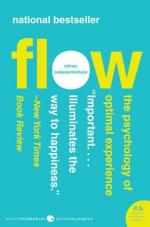
|
| Name: _________________________ | Period: ___________________ |
This test consists of 5 multiple choice questions, 5 short answer questions, and 10 short essay questions.
Multiple Choice Questions
1. What is NOT one of the things a person may need in order to cope with stress?
(a) External support.
(b) Coping strategies.
(c) Medication.
(d) Psychological abilities.
2. Entire civilizations have been built around specific forms of ________, according to the author's research.
(a) Work.
(b) Stones.
(c) Money.
(d) Children.
3. To experience optimal flow, one must find a _____________ in the work and achieve all that can be achieved.
(a) Love.
(b) Ally.
(c) Position.
(d) Purpose.
4. The way people relate to other members of their family is telling of their ___________ condition.
(a) Work.
(b) Mental.
(c) Flow.
(d) Spiritual.
5. A more compelling way to occupy the mind is to ____________, according to the author.
(a) Read.
(b) Watch movies.
(c) Daydream.
(d) Go back to school.
Short Answer Questions
1. The Amish have a tradition of _________ people who misbehave or who break the law within their tradition.
2. Some may choose to work when it is not ____________, for the sheer challenge and enjoyment of it all.
3. A person should seek to form a job in such a way that it resembles a _______ activity, such as weaving or hunting.
4. Contrary to popular opinions, health and wealth are not cures for ___________ in life.
5. One of the most rewarding and complex relationships one will ever deal with is that of _____________.
Short Essay Questions
1. What kind of animals does the author say that humans are by nature?
2. What are some of the downsides of solitude when it is not actively pursued for a person?
3. What does the author believe happens when the mind doesn't have any real demands for its attention?
4. What happens to those people in a society who are shunned and taken out of the community where they live?
5. How does a person prevent himself from having to dwell on negative thoughts in the brain?
6. What happens when the body is not involved in physical activity, according to the author?
7. What did Sigmund Freud have to say about the recipe for happiness; what it includes in his opinion?
8. What is the one most complex and rewarding relationships one will ever deal with?
9. What are the three basic things a person needs to cope with the obstacles in one's life, according to this section of the book?
10. What used to be the reason for people to get married to each other, though the reasons have changed today?
|
This section contains 585 words (approx. 2 pages at 300 words per page) |

|




